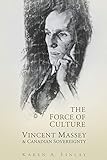The Force of Culture : Vincent Massey and Canadian Sovereignty / Karen Finlay.
Material type: TextSeries: HeritagePublisher: Toronto : University of Toronto Press, [2004]Copyright date: ©2004Description: 1 online resource (362 p.)Content type:
TextSeries: HeritagePublisher: Toronto : University of Toronto Press, [2004]Copyright date: ©2004Description: 1 online resource (362 p.)Content type: - 9781442657663
- 9781442620872
- 971.063/092
- F1034.3.M34
- online - DeGruyter
| Item type | Current library | Call number | URL | Status | Notes | Barcode | |
|---|---|---|---|---|---|---|---|
 eBook
eBook
|
Biblioteca "Angelicum" Pont. Univ. S.Tommaso d'Aquino Nuvola online | online - DeGruyter (Browse shelf(Opens below)) | Online access | Not for loan (Accesso limitato) | Accesso per gli utenti autorizzati / Access for authorized users | (dgr)9781442620872 |
Browsing Biblioteca "Angelicum" Pont. Univ. S.Tommaso d'Aquino shelves, Shelving location: Nuvola online Close shelf browser (Hides shelf browser)

|

|

|

|

|

|

|
||
| online - DeGruyter Northrop Frye and the Poetics of Process / | online - DeGruyter Northrop Frye's Notebooks on Renaissance Literature / | online - DeGruyter Littere Baronum : The Earliest Cartulary of the Counts of Champagne / | online - DeGruyter The Force of Culture : Vincent Massey and Canadian Sovereignty / | online - DeGruyter Canadian State Trials, Volume II : Rebellion and Invasion in the Canadas, 1837-1839 / | online - DeGruyter No Trespassing : Authorship, Intellectual Property Rights, and the Boundaries of Globalization / | online - DeGruyter Industrial Sunset : The Making of North America's Rust Belt, 1969-1984 / |
restricted access online access with authorization star
http://purl.org/coar/access_right/c_16ec
A misunderstood and sometimes maligned figure, Vincent Massey was one of Canada's most influential cultural policy-makers and art patrons. Best known as Canada's first native-born Governor General, he chaired the landmark Royal Commission on National Development in the Arts, Letters, and Sciences that led to the creation of the Canada Council. The Force of Culture examines Massey's notion of culture, its conflicted roots in late nineteenth-century and early twentieth-century Canadian Protestant thought, and Massey's transformation into a champion of culture as a bastion of Canadian sovereignty.Karen Finlay's study goes beyond existing literature by examining the role of Massey's Methodist upbringing in instilling an education gospel as the bedrock of culture and the foundation of a national citizenry. The study also reassesses Massey's reputation as a supporter of the fine arts. Steeped in Methodism, his attitudes towards the arts were ambiguous. He never adopted a purely art-for-art's sake doctrine, but came to understand that the arts, without being moralizing, could serve a moral and cultural purpose: the expression and affirmation of national character and sovereignty.As well as charting Massey's evolving attitudes towards culture and the arts, Finlay attempts to redress the common charges of sexism, elitism, and anglophonism levelled against him. Finlay stresses Massey's contradictory views on issues relating to gender, race, and class, outweighed by the ongoing legacy of his belief in Canadian cultural diversity. Above all, Massey valorized the principles of excellence and diversity as twin antidotes to the anathema of conformity and cultural homogenization. The tenet Massey sought to honour, pertaining deeply to the collective and moral nature of humanism in Canada, Finlay argues, was community without uniformity. The Force of Culture shows that Massey was, in certain respects, a democratizer and even a populist, who believed that difference need not divide. Disclaimer: Images removed at the request of the rights holder
Mode of access: Internet via World Wide Web.
In English.
Description based on online resource; title from PDF title page (publisher's Web site, viewed 01. Nov 2023)


